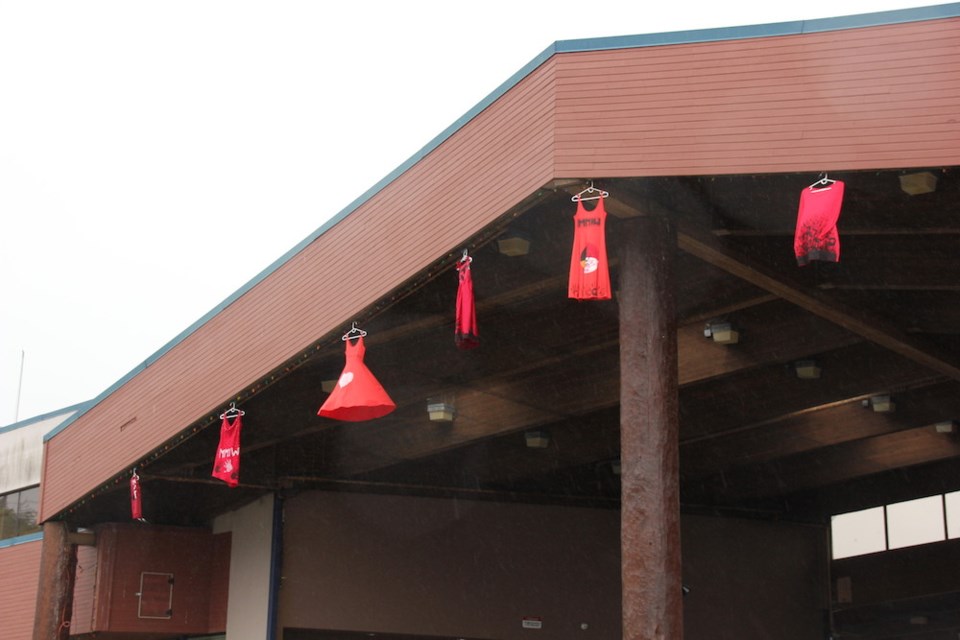On May 5, 10 red dresses were hung from the rafters of the shíshálh Nation administration building, their colourful fabric twirling in the wind as they carry a powerful message: “No more stolen sisters.”
It’s the National Day of Awareness for Missing and Murdered Indigenous Women and Girls (MMIWG), also known as Red Dress Day. Ceremonies and similar displays will be taking place across the country.
The dresses were raised by a boom lift and come from the Pathways to Higher Learning students, shíshálh Nation said in a social media post. The students were inspired after attending the MMIWG March in Vancouver on Feb. 14.
"The event in Vancouver is especially important to our community as it was started to remember and honour the loss of one of our own community members. Our students were so moved by the event, that they wanted to do more and from that came the Red Dress project you see in front of our Nation buildings. Each dress is a personal work of art, created by our students to express their feelings," shíshálh Nation's post said.
"The dresses are hung to represent the women who have not made it home, who are missing and murdered. We want to show the world that they matter. Great Gratitude to leadership for standing behind this project and helping to make it a reality. Great Gratitude to our students for the beautiful, meaningful and impactful works of art now hanging from the eaves of the Nation offices."
Calls to action
On May 2, the House of Commons unanimously backed a motion to declare the deaths and disappearances of Indigenous women and girls a Canada-wide emergency. That motion also calls for funding a new system to alert the public when someone goes missing.
Even though the final report into missing and murdered Indigenous women and girls was released four years ago not much has changed, said Carol McBride, the head of the Native Women’s Association of Canada. “We are in a crisis.”
The Native Women’s Association of Canada has created the website SafePassage, a "community-driven, trauma-informed, and survivor centred initiative" that "tracks cases of missing and murdered Indigenous women, girls, transgender, gender-diverse, and Two-Spirit people (MMIWG2S+), monitors ongoing safety concerns, provides distinctions-based safety resources, educates the public and media about the MMIWG2S+ genocide, and commemorates and honours our stolen loved ones."
The report
The final report of the National Inquiry into Missing and Murdered Indigenous Women and Girls was released in June 2019 and came after two years of public hearings and evidence gathering across the country where the inquiry heard from more than 2,380 "family members, survivors of violence, experts and Knowledge Keepers," according to the inquiry website. The final report identified 231 calls for justice for "governments, institutions, social service providers, industries and all Canadians" under themes of culture, health and wellness, human security, and justice.
"The truths shared in these National Inquiry hearings tell the story – or, more accurately, thousands of stories – of acts of genocide against First Nations, Inuit and Métis women, girls, and 2SLGBTQQIA people," says the introduction to the final report's executive summary. "This violence amounts to a race-based genocide of Indigenous Peoples, including First Nations, Inuit, and Métis, which especially targets women, girls, and 2SLGBTQQIA people.
"This genocide has been empowered by colonial structures, evidenced notably by the Indian Act, the Sixties Scoop, residential schools, and breaches of human and Inuit, Métis and First Nations rights, leading directly to the current increased rates of violence, death, and suicide in Indigenous populations."
Following the report's release, Prime Minister Justin Trudeau promised to develop and implement a national action plan to address MMIWG2S+, which was released in 2021. A progress report was produced in 2022.
With files from Kelly Geraldine Malone, The Canadian Press



